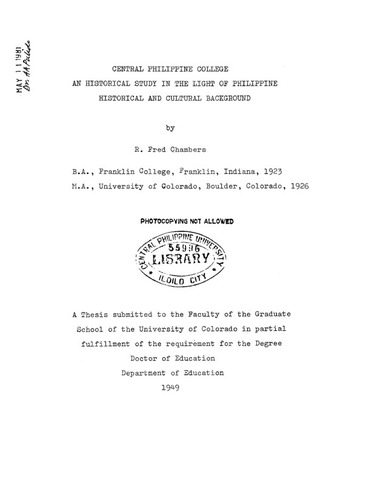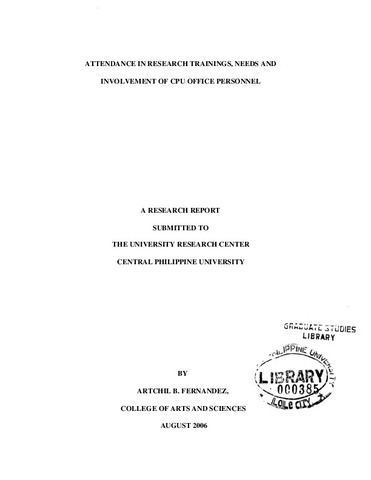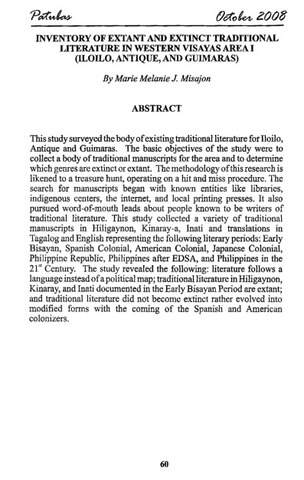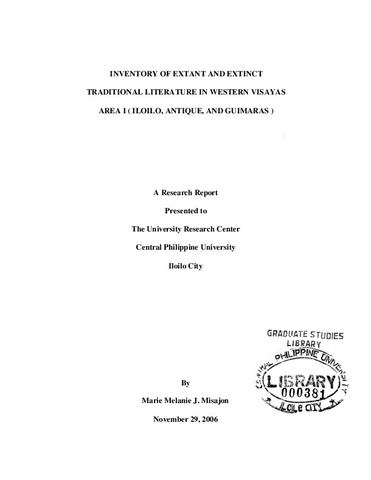Central Philippine College: A historical study in the light of Philippine historical and cultural background
Résumé
This study is an attempt to write a history of Central Philippine College in the light of the Philippine background: political, socio-economic, religious and educational; and, to indicate the influence of one upon the other.
A survey of the general background reveals the following facts. The American regime in the Philippines radically changed that country's history from what it had been under Spanish control. It meant the introduction of the American democratic way of government and life, supported by the American public educational system introduced into the Philippines, with English as the language of instruction, and with emphasis upon the principle of separation of Church and State. This was a radical change from nearly three centuries of Spanish control in which arbitrary rule by Spanish military and Roman Catholic Church leaders determined the life of the Filipinos. The period of this study, approximately the first forty years of the present century, saw the development of the Republic and some degree of democratic life in the Philippines. It saw evidence of the emergence of a much needed middle class in Philippine society to offset the unwholesome situation in which a small, aristocratic ruling upper class exploited a poor, ignorant peasant class. It saw the emergence of some degree of individual enterprise and some development of a Filipino economy looking toward ultimate economic foundations for assuring political independence. This was not so effectively achieved because a system of American economic paternalism had developed through the sugar industry. The period saw a change from complete control of the Roman Catholic Church, with its authoritarian system, to the development of other religious sects to break the monopoly of that Church on life and thought. It saw the development of a nationalistic adaptation of the Catholic Church, Aglipayanism, and the growth of Protestantism. In general it meant the infiltration of liberal ideas to achieve some degree of democracy in religious thought. The period saw one of the most unusual experiments in colonization and education. The American public educational system was transplanted on foreign soil and vindicated its claim to contribute to the formation of a democratic society. The Filipinos seized upon education and the language of their rulers as the most effective way to achieve their independence. The result was the establishment of a national educational system within which opportunity was afforded for private education to do a particular work of supplementing and pioneering where the former system was limited. It is probable that in no country in the world have a people given such whole hearted support to education as in the Philippines. In all of these phases of Filipino life there was one unifying purpose which gave extra meaning and effort to high achievement, that was the passion for complete independence.
Within the framework of the above situation Central Philippine College found its origin and development. The founding of the institution was the result of the aggressive outreach of the American Baptist Foreign Mission Society and the opportunity afforded by historical development when the United States took over the Philippines. The College began as a Bible and Industrial school to educate leaders for the church and to teach the constituency to read and write that they might become effective laymen for strengthening and advancing the Protestant churches established in the Philippines. The pattern of control followed American rule in the Philippines, although the American government gave more control, and earlier, to the Filipinos than did the College. In general it was paternalism with the purpose to withdraw at the right time; the right time defined as that time when the Filipino was capable of managing his own affairs with least liability to himself and to others. The educational development of Central followed generally that of the public educational system. At first the emphasis was upon vocational education, then upon the academic until the latter dominated the system. However, the Jaro Industrial School (Central's beginning) did attract national attention at its inception by its emphasis upon democratic methods of student government. The growth of the institution was affected by the development of public education, American missionary leadership, and the general policies set up by the American Baptist Foreign Mission Society in New York City. The institution throughout its history never had adequate resources, material or personal, to do the work which opportunity presented. However, it did move from complete dependence financially to almost complete self-support. It was moving steadily toward complete administrative control by Filipinos and lacked chiefly some qualified Filipino president to effect administrative in dependence from American control. In the period of its history before the war, Central moved from a small inconspicuous school to a nationally recognized institution of higher education. It had developed a reputation for high standards and had sent men and women into Philippine society who were having a definite influence on the life of the country.
There was a definite interplay of influence between the country and Central. The Spanish regime in the Philippines influenced the history of Central Philippine College by its leaving in the minds of the Filipinos a memory of Spanish government and Roman Catholic oppression, unsatisfactory social and land system, and in starting them on their struggle for independence, It gave the Philippines a background in the Christian religion and some contact with western civilization and the outside world. These influenced the type of educational program launched by American Baptists and determined opposition by the Catholic Church.
The American regime provided an environment in the Philippines which encouraged the founding of Central Philippine College. It established a framework of democratic government within which the Philippines could work for self-government, aided by the separation of church and state, material improvements, education and the use of the English language. Central's educational program and its success was determined by these factors. By its emphasis upon social equality, the dignity of labor for self-support, liberal education for self realization, and freedom of thought and democracy in religion, the College was allied with the general movement in the Philippines and influenced thereby. As the nation grew in self government, the plan and policy of Central Philippine College was influenced to adapt itself to the change of a growing sense of freedom and self-determinism. However, throughout its history, the College felt the effects of both Spanish and American influences.
Central Philippine College not only was influenced by, and received benefits from, her Philippine background but she also influenced and contributed to the Philippine nation. Politically the College helped by contributing in part to solve the problems of poverty, social inequality and the need for developing democracy in every phase of life and thought. The College trained men and women who became leaders in various areas of community life. These constituted the beginning of a much needed middle class to counteract the evils of via two class society and an unsatisfactory domestic economic system. By educating citizens, motivated by Christian ideals, Central made her contribution to the leadership and thought that went into the formation of the Philippine Republic.
Central contributed to the development of a more liberal religious condition in the Philippines by the introduction of Protestant Christian ideas and institutions, by encouraging Aglipayanism, which combined patriotism and revolt against religious autocracy, and by stimulating the Roman Catholic Church to improve its policies.
In education, Central not only supplemented the work of public education but helped improve the standards of education in general and encouraged progressive methods and growth. By its cooperative attitude, it encouraged the development of high standards in private education and assumed prominent leadership in unifying the efforts of evangelical schools and colleges in the Philippines.
This study has made it possible to appreciate the work of Central Philippine College and the efforts of those who sought to make it an educational institution of worth in the Philippines. It should serve to help orient anyone who may be interested in Philippine education, particularly private education, and it should be of practical value to anyone joining the staff of Central Philippine College, by giving him a background and historical perspective in the objectives and program of that institution. It should be of value both to American and Filipino administrators in attempting to evaluate and plan the program for the College.
Description
Abstract only
Suggested Citation
Chambers, R. F. (1949). Central Philippine College: A historical study in the light of Philippine historical and cultural background (Unpublished Doctoral dissertation). University of Colorado.
Type
DissertationSujet
Department
Graduate SchoolDegree
Doctor of EducationShelf Location
GSL Theses 378.242 C355
Physical Description
x, 347 leaves
Collections
- Dissertations [6]
Related items
Showing items related by title, author, creator and subject.
-
Attendance in research trainings, needs and involvement of CPU office personnel
Fernandez, Artchil B. (Central Philippine University, 2006-08)The study was conducted mainly to determine the attendance in research trainings, needs and research involvement of CPU office personnel. It utilized a one-shot survey design. Using census technique (total enumeration), ... -
Inventory of extant and extinct traditional literature in Western Visayas area I (Iloilo, Antique, and Guimaras)
Javier, Marie Melanie J. (Central Philippine University, 2008-10)This study surveyed the body of existing traditional literature for Iloilo, Antique and Guimaras. The basic objectives of the study were to collect a body of traditional manuscripts for the area and to determine which ... -
Inventory of extant and extinct traditional literature in Western Visayas area I (Iloilo, Antique, and Guimaras)
Javier, Marie Melanie J. (Central Philippine University, 2006-11)This study surveyed the body of existing traditional literature for Iloilo, Antique and Guimaras. The basic objectives of the study are to collect a body of traditional manuscripts for the area and to determine which genres ...





